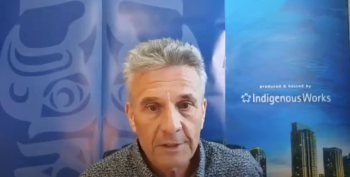Image Caption
Summary
Local Journalism Initiative Reporter
Windspeaker.com
Kelly Lendsay says it’s time for businesses to start taking reconciliation more seriously.
Lendsay is president and CEO of Indigenous Works, an organization that strives to improve the inclusion and engagement of Indigenous people in the Canadian economy.
Indigenous Works hosted a webinar on Jan. 25 titled Are Your HR Professionals Just Checking The Box?
The 60-minute presentation discussed expanding reconciliation efforts beyond the basics.
“Going beyond the checkmark is about deliberate and purposeful strategies,” Lendsay said. “You can learn knowledge. You can develop partnerships and relationships… You can create some really objective metrics and measurements and protocols to showcase.
“And I think we’re now at the stage of really growing meaningful reconciliation strategies through these efforts.”
Lendsay (Cree/Métis) believes an organization is risking its reputation if it’s just doing the minimum amount of work.
“Some of this work is very difficult and you need to be demonstrating that you are indeed making the effort; that there is a commitment from the top down right to the work floor and that you’ve got the metrics and narratives to support that,” he said.
Craig Hall, vice-president of strategy and consulting at Indigenous Works, believes organizations are keen to show they are doing their part.
“There’s certainly a change in the fabric of Canada these days with much more information coming across media,” he said.
“But there’s still some work to be done. We look at reconciliation. What does it actually mean from an organizational and impact perspective? And, of course, each organization has its own views on how reconciliation could and should be done.”
Hall said the checking-the-box approach is not a sound strategy these days.
“If your only strategy is a land acknowledgement, and we recognize the importance of land acknowledgements, but if that is your only approach then you’re going to come up short on things,” he said.
“I’m saying here that you need to adopt a much more wholesome approach to Indigenous relations.”
Hall noted the significantly large number of recent court rulings across the country involving Indigenous issues, saying that they had implications that non-Indigenous companies and organizations need to be aware of when it comes to Indigenous engagements, building relationships and building partnerships.
Hall made specific mention of the United Nations Declaration on the Rights of Indigenous Peoples.
“That’s had a profound impact on the policy landscape, program landscape and legislation throughout Canada and other parts of the world,” he said.
“It’s a critically profound and interesting and well-written document. And companies are increasingly looking at it in much deeper ways and trying to understand the implications on their own strategies.”
Lendsay echoed this sentiment.
“We’re at a stage where people are so much more serious" he said. "They’re committed. They’re advanced. They’re becoming more sophisticated in terms of going more beyond the checkmark. And when we do, it creates better workplaces, stronger communities and a stronger Canada. And that’s where we’re going.”
Indigenous Works’ webinar included some taped comments from Terri Dougall, a board member of the organization. Dougall is also a senior director at Calian Group Ltd., an Ottawa-based, publicly-traded business.
“It’s a long journey,” Dougall said of reconciliation efforts for any company. “It’s not something that you can do overnight. You really need to be committed to working with the communities, bringing in Indigenous leadership.”
Dougall said business officials also have to be open to having some difficult chats.
“You have to be able to ask questions and have open conversations and sometimes maybe not get the answers that you would like to hear,” she said. “But you have to be open to learning. And that’s a big piece of this as well.”
Support Independent Journalism. SUPPORT US!

